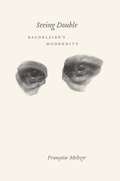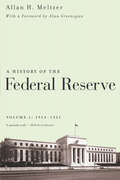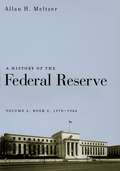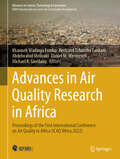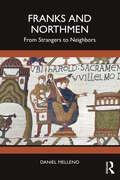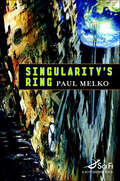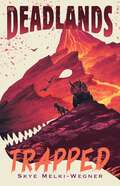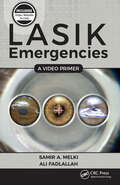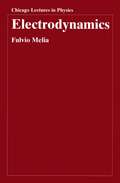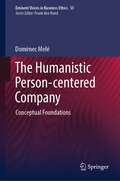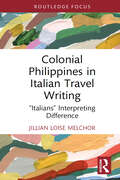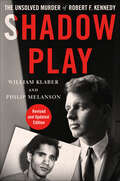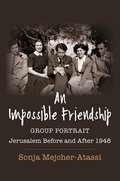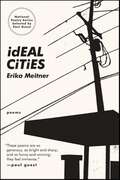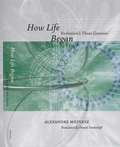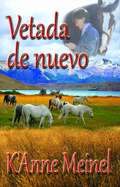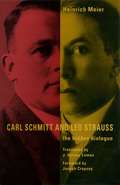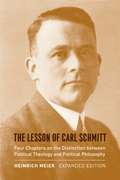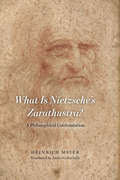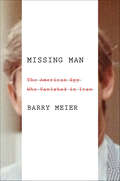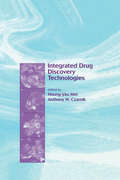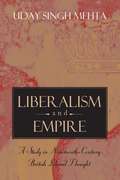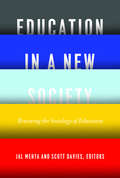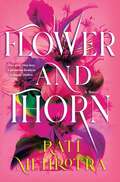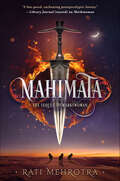- Table View
- List View
Seeing Double: Baudelaire's Modernity
by Françoise MeltzerThe poet Charles Baudelaire (1821–1867) has been labeled the very icon of modernity, the scribe of the modern city, and an observer of an emerging capitalist culture. Seeing Double reconsiders this iconic literary figure and his fraught relationship with the nineteenth-century world by examining the way in which he viewed the increasing dominance of modern life. In doing so, it revises some of our most common assumptions about the unresolved tensions that emerged in Baudelaire’s writing during a time of political and social upheaval.Françoise Meltzer argues that Baudelaire did not simply describe the contradictions of modernity; instead, his work embodied and recorded them, leaving them unresolved and often less than comprehensible. Baudelaire’s penchant for looking simultaneously backward to an idealized past and forward to an anxious future, while suspending the tension between them, is part of what Meltzer calls his “double vision”—a way of seeing that produces encounters that are doomed to fail, poems that can’t advance, and communications that always seem to falter. In looking again at the poet and his work, Seeing Double helps to us to understand the prodigious transformations at stake in the writing of modern life.
A History of the Federal Reserve: 1913–1951
by Allan H. MeltzerAllan H. Meltzer's monumental history of the Federal Reserve System tells the story of one of America's most influential but least understood public institutions. This first volume covers the period from the Federal Reserve's founding in 1913 through the Treasury-Federal Reserve Accord of 1951, which marked the beginning of a larger and greatly changed institution. To understand why the Federal Reserve acted as it did at key points in its history, Meltzer draws on meeting minutes, correspondence, and other internal documents (many made public only during the 1970s) to trace the reasoning behind its policy decisions. He explains, for instance, why the Federal Reserve remained passive throughout most of the economic decline that led to the Great Depression, and how the Board's actions helped to produce the deep recession of 1937 and 1938. He also highlights the impact on the institution of individuals such as Benjamin Strong, governor of the Federal Reserve Bank of New York in the 1920s, who played a key role in the adoption of a more active monetary policy by the Federal Reserve. Meltzer also examines the influence the Federal Reserve has had on international affairs, from attempts to build a new international financial system in the 1920s to the Bretton Woods Agreement of 1944 that established the International Monetary Fund and the World Bank, and the failure of the London Economic Conference of 1933. Written by one of the world's leading economists, this magisterial biography of the Federal Reserve and the people who helped shape it will interest economists, central bankers, historians, political scientists, policymakers, and anyone seeking a deep understanding of the institution that controls America's purse strings. "It was 'an unprecedented orgy of extravagance, a mania for speculation, overextended business in nearly all lines and in every section of the country.' An Alan Greenspan rumination about the irrational exuberance of the late 1990s? Try the 1920 annual report of the board of governors of the Federal Reserve. . . . To understand why the Fed acted as it did—at these critical moments and many others—would require years of study, poring over letters, the minutes of meetings and internal Fed documents. Such a task would naturally deter most scholars of economic history but not, thank goodness, Allan Meltzer."—Wall Street Journal "A seminal work that anyone interested in the inner workings of the U. S. central bank should read. A work that scholars will mine for years to come."—John M. Berry, Washington Post "An exceptionally clear story about why, as the ideas that actually informed policy evolved, things sometimes went well and sometimes went badly. . . . One can only hope that we do not have to wait too long for the second installment."—David Laidler, Journal of Economic Literature "A thorough narrative history of a high order. Meltzer's analysis is persuasive and acute. His work will stand for a generation as the benchmark history of the world's most powerful economic institution. It is an impressive, even awe-inspiring achievement."—Sir Howard Davies, Times Higher Education Supplement
A History of the Federal Reserve: Book 2, 1970–1986
by Allan H. MeltzerAllan H. Meltzer’s critically acclaimed history of the Federal Reserve is the most ambitious, most intensive, and most revealing investigation of the subject ever conducted. Its first volume, published to widespread critical acclaim in 2003, spanned the period from the institution’s founding in 1913 to the restoration of its independence in 1951. This two-part second volume of the history chronicles the evolution and development of this institution from the Treasury–Federal Reserve accord in 1951 to the mid-1980s, when the great inflation ended. It reveals the inner workings of the Fed during a period of rapid and extensive change. An epilogue discusses the role of the Fed in resolving our current economic crisis and the needed reforms of the financial system.In rich detail, drawing on the Federal Reserve’s own documents, Meltzer traces the relation between its decisions and economic and monetary theory, its experience as an institution independent of politics, and its role in tempering inflation. He explains, for example, how the Federal Reserve’s independence was often compromised by the active policy-making roles of Congress, the Treasury Department, different presidents, and even White House staff, who often pressured the bank to take a short-term view of its responsibilities. With an eye on the present, Meltzer also offers solutions for improving the Federal Reserve, arguing that as a regulator of financial firms and lender of last resort, it should focus more attention on incentives for reform, medium-term consequences, and rule-like behavior for mitigating financial crises. Less attention should be paid, he contends, to command and control of the markets and the noise of quarterly data.At a time when the United States finds itself in an unprecedented financial crisis, Meltzer’s fascinating history will be the source of record for scholars and policy makers navigating an uncertain economic future.
Advances in Air Quality Research in Africa: Proceedings of the First International Conference on Air Quality in Africa (ICAQ'Africa 2022) (Advances in Science, Technology & Innovation)
by Abdelwahid Mellouki Khanneh Wadinga Fomba Bertrand Tchanche Fankam Daniel M. Westervelt Michael R. GiordanoThis book presents the recent findings on air quality in Africa from the virtual event of the first International Conference on Air Quality in Africa (ICAQ 2022), providing a comprehensive overview on many subjects of air pollution that affect African society. It highlights research progress in the chemical and physical characterization of air pollutants, their related respiratory and non-respiratory health effects, measurements and monitoring of air pollutants using satellite remote sensing and modeling techniques, currently implemented abatement policies in different African countries, existing research and networking infrastructures, and novel tools for monitoring air quality. The advances in the development of local cost-effective air quality monitoring tools in Africa as well as the use of low-cost sensors in quantifying air quality levels are presented. This book is an enrichment for researchers, experts, and advocates of air quality, atmospheric chemistry and physics, satellite remote sensing applications, and policymakers in Africa.
Franks and Northmen: From Strangers to Neighbors
by Daniel MellenoFranks and Northmen explores the full spectrum of Franco-Scandinavian interaction, examining not just violence but also less well-known relationships centered on acts of diplomacy, commerce, and mission and demonstrating the transformative nature of cross-cultural encounter during the Viking Age.In the year 777, the Frankish sources mention the Northmen, better known to most as the Vikings, for the first time. By the tenth century these Northmen, once a mysterious people on the borders of the Carolingian Empire, would be a familiar presence in the Frankish world. As raiders and pillagers, the Vikings would fill the pages of Frankish authors, leaving a legacy that continues to fascinate even to the twenty-first century. But a closer look at sources, both textual and material, reveals that the relationships between Franks and Northmen were far more complex and multifaceted than a rigid focus on Viking violence might suggest. Merchants carried goods across the North Sea, missionaries encouraged new ways of understanding the world, and Franks and Northmen formed relationships and bonds even amidst conflict and violence.This study is a useful resource for both students and specialists of central and northern Europe in the early medieval period.
Singularity's Ring
by Paul MelkoThe debut novel from a exciting new voice in SF—about what happens after ninety percent of humanity leaves Earth There is an artificial ring around the Earth and it is empty after the Singularity. Either all the millions of inhabitants are dead, or they have been transformed into energy beings beyond human perception. Earth's population was reduced by ninety percent. Human civilization on Earth is now recovering from this trauma and even has a vigorous space program. Apollo Papadopulos is in training to become the captain of the starship Consensus. Apollo is a unique individual in that he/she/it is not an individual at all, but five separate teenagers who form a new entity. Strom, Meda, Quant, Manuel, and Moira are a pod, as these kinds of personalities are called, genetically engineered to work as one and to be able to communicate non-verbally. As a rare quintet, much relies on the successful training of Apollo, but as more accidents occur, the pod members struggle just to survive. At the Publisher's request, this title is being sold without Digital Rights Management Software (DRM) applied.
The Deadlands: Trapped (The Deadlands #2)
by Skye Melki-WegnerWings of Fire meets Jurassic Park in The Deadlands: Trapped, the second book of this action-adventure series by Skye Melki-Wegner about five outcasts—and former enemies—who are the only hope to save their warring kingdoms from impending doom.As bloody battle rages on between the two surviving dinosaur kingdoms, Eleri and his fellow outcasts, newly exiled from their herds, are searching for evidence to prove a mass conspiracy—a conniving cabal of carnivores have manipulated the herbivore kingdoms into war, so they can feast on the slain. But after their temporary home is discovered by a vengeful pack of raptors, the exiles must flee and soon find themselves trapped inside the Fire Peak: the volcanic heart of the dreaded Carrion Kingdom. Before they have a chance to escape, they discover a cavern of imprisoned herbivores, who are being picked apart—literally—one by one. Can the outcasts stage an elaborate heist to free the prisoners and gather proof of the Carrion Kingdom’s vicious plans in one fell swoop?
LASIK Emergencies: A Video Primer
by Samir A. Melki Ali FadlallahFemtosecond-assisted laser in-situ keratomileusis flaps have revolutionized refractive surgery since their introduction. The use of the femtosecond laser to create the LASIK flap has led to an improvement in the safety profile of the flap creation step as compared to the mechanical microkeratome. Although this laser is exceedingly safe, complications still do occur. LASIK Emergencies: A Video Primer focuses specifically on the different flap complications that are still known to occur and their management.Designed as a narrated video-based book of ophthalmic surgeries, LASIK Emergencies covers the entire spectrum of Intralase flap complications. With 15 chapters, this book and accompanying website contains nearly 4 hours of state-of-the-art video teaching.Drs. Samir Melki and Ali Fadlallah have designed LASIK Emergencies so that each chapter focuses on a specific complication and its management, and features multiple videos for each. Each video is edited in such a way that the viewer can quickly grasp all the relevant information without having to sit through extensive, unedited surgical videos.Some Complications Covered: Loss of suction Air bubbles in the Anterior Chamber Irregular Flaps Subconjunctival hemorrhage and bleeding Ophthalmologists, laser ophthalmic technicians, and optometrists alike will appreciate this unique resource, as LASIK Emergencies: A Video Primer covers the entire spectrum of LASIK complications in a detailed, yet digestible manner.
Electrodynamics (Chicago Lectures in Physics)
by Fulvio MeliaPractically all of modern physics deals with fields—functions of space (or spacetime) that give the value of a certain quantity, such as the temperature, in terms of its location within a prescribed volume. Electrodynamics is a comprehensive study of the field produced by (and interacting with) charged particles, which in practice means almost all matter. Fulvio Melia's Electrodynamics offers a concise, compact, yet complete treatment of this important branch of physics. Unlike most of the standard texts, Electrodynamics neither assumes familiarity with basic concepts nor ends before reaching advanced theoretical principles. Instead this book takes a continuous approach, leading the reader from fundamental physical principles through to a relativistic Lagrangian formalism that overlaps with the field theoretic techniques used in other branches of advanced physics. Avoiding unnecessary technical details and calculations, Electrodynamics will serve both as a useful supplemental text for graduate and advanced undergraduate students and as a helpful overview for physicists who specialize in other fields.
The Humanistic Person-centered Company (Issues in Business Ethics #55)
by Domènec MeléHumanism in business is not only an alternative to economism but a way to human excellence. Humanism presented here revolves around the rich notion of “human person”, keystone of modern personalist philosophy and Catholic Social Teaching. From this perspective this book is offered to everyone, believer and nonbeliever alike. The person-centered humanism considers the human-wholeness, individual and relational, with subjectivity, self-determination, openness to transcendence, and with capacity not only to possess but also to give. It also highlights the uniqueness of each person, endowed with a high constitutive dignity and in continuous process of flourishing toward human plenitude. An attitude of respect and good will is due to non-personal beings, while persons deserve to be treated with justice and even with love of benevolence. The book is prepared in dialogue with mainstream of thought in business and business ethics and focused on exploring ways to improve some conventional views. It includes some proposals such as a person-based ethics, ethics understood as intrinsic to business activity, the consideration of the company as an organized community of persons, and the purpose of the company oriented toward the common good through a double mission, internal and external. It is also suggested substituting the notion of “stakeholder” for the richer one of “relationholder.”
Colonial Philippines in Italian Travel Writing: “Italians” Interpreting Difference (Routledge Focus on Literature)
by Jillian Loise MelchorThe first comprehensive review of all extant "Italian" chronicles set in the Philippine Islands, this book juxtaposes "Filipino" Otherness with the unique condition of "Italian" ambivalence and alterity within Europe.This book's contribution to the critical studies of travel is the opening of an analytical middle ground, highlighting the ambivalence of Italian chroniclers while acknowledging their participation in epistemological practices subsumed within the broader enterprise of conquest.Beyond the role of travel writing in colonial episteme, the book also situates the act of writing about one’s travels in instances of national character building (in Italy’s case) and in attempts of constructing a national historiography (in the Philippines' case). This manner of nuancing literary productions by the West while navigating its implications in the East, specifically, how pre-Unification “Italian” travel informed nationalist constructions in the Revolutionary Philippines, could enrich our understanding of and refract monolithic conceptions of metropole−periphery relations.
Shadow Play: The Unsolved Murder of Robert F. Kennedy
by Philip Melanson William KlaberThis updated edition for the 50th anniversary of Robert F. Kennedy’s murder explores ignored witness accounts, coerced testimony, bullet-hole evidence, and other issues surrounding the political homicide, and is the basis for the new podcast, The RFK Tapes, which debuted at #1 on the iTunes chart, available now.On June 4, 1968, just after he had declared victory in the California presidential primary, Robert F. Kennedy was gunned down in the kitchen of the Ambassador Hotel. Captured a few feet away, gun in hand, was a young Palestinian-American named Sirhan Sirhan. The case against Sirhan was declared “open and shut” and the court proceedings against him were billed as “the trial of the century”; American justice at its fairest and most sure. But was it? By careful examination of the police files, hidden for twenty years, William Klaber and Philip Melanson's Shadow Play explores the chilling significance of altered evidence, ignored witnesses, and coerced testimony. It challenges the official assumptions and conclusions about this most troubling, and perhaps still unsolved, political murder.
An Impossible Friendship: Group Portrait, Jerusalem Before and After 1948 (Religion, Culture, and Public Life #47)
by Sonja Mejcher-AtassiIn Jerusalem, as World War II was coming to an end, an extraordinary circle of friends began to meet at the bar of the King David Hotel. This group of aspiring artists, writers, and intellectuals—among them Wolfgang Hildesheimer, Jabra Ibrahim Jabra, Sally Kassab, Walid Khalidi, and Rasha Salam, some of whom would go on to become acclaimed authors, scholars, and critics—came together across religious lines in a fleeting moment of possibility within a troubled history. What brought these Muslim, Jewish, and Christian friends together, and what became of them in the aftermath of 1948, the year of the creation of the State of Israel and the Palestinian Nakba?Sonja Mejcher-Atassi tells the story of this unlikely friendship and in so doing offers an intimate cultural and social history of Palestine in the critical postwar period. She vividly reconstructs the vanished social world of these protagonists, tracing the connections between the specificity of individual lives and the larger contexts in which they are embedded. In exploring this ecumenical friendship and its artistic, literary, and intellectual legacies, Mejcher-Atassi demonstrates how social biography can provide a picture of the past that is at once more inclusive and more personal. This group portrait, she argues, allows us to glimpse alternative possibilities that exist within and alongside the fraught history of Israel/Palestine. Bringing a remarkable era to life through archival research and nuanced interdisciplinary scholarship, An Impossible Friendship unearths prospects for historical reconciliation, solidarity, and justice.
Ideal Cities: Poems (National Poetry Series)
by Erika Meitner“These poems are so generous, so bright and sharp, so funny and winning, they feel immense.” —Paul Guest“Erika Meitner is the new voice of intelligent and emotional poems. Good for poetry. Good for poetry lovers. Good for the rest of us, too.”— Nikki Giovanni Exploring themes of pregnancy, motherhood, ancestry, and life in the borderline slums of Washington, DC, the richly felt and adroit poetry of Erika Meitner’s Ideal Cities moves, mesmerizes, and delights. The work of an important emerging voice in contemporary American poetry—a winner of the 2009 National Poetry Series Prize as selected by Paul Guest—Ideal Cities gloriously perpetuates NPS’s long-standing tradition of promoting exceptional poetry from lesser-known poets.
How Life Began: Evolution's Three Geneses
by Alexandre MeineszThe origin of life is a hotly debated topic. The Christian Bible states that God created the heavens and the Earth, all in about seven days roughly six thousand years ago. This episode in Genesis departs markedly from scientific theories developed over the last two centuries which hold that life appeared on Earth about 3.5 billion years ago in the form of bacteria, followed by unicellular organisms half a millennia later. It is this version of genesis that Alexandre Meinesz explores in this engaging tale of life's origins and evolution. How Life Began elucidates three origins, or geneses, of life—bacteria, nucleated cells, and multicellular organisms—and shows how evolution has sculpted life to its current biodiversity through four main events—mutation, recombination, natural selection, and geologic cataclysm. As an ecologist who specializes in algae, the first organisms to colonize Earth, Meinesz brings a refreshingly novel voice to the history of biodiversity and emphasizes here the role of unions in organizing life. For example, the ingestion of some bacteria by other bacteria led to mitochondria that characterize animal and plant cells, and the chloroplasts of plant cells. As Meinesz charmingly recounts, life’s grandeur is a result of an evolutionary tendency toward sociality and solidarity. He suggests that it is our cohesion and collaboration that allows us to solve the environmental problems arising in the decades and centuries to come. Rooted in the science of evolution but enlivened with many illustrations from other disciplines and the arts, How Life Began intertwines the rise of bacteria and multicellular life with Vermeer’s portrait of Antoni van Leeuwenhoek, the story of Genesis and Noah, Meinesz’s son’s early experiences with Legos, and his own encounters with other scientists. All of this brings a very human and humanistic tone to Meinesz’s charismatic narrative of the three origins of life.
Vetada de nuevo: Viviendo en un rancho, las dos jóvenes intentan sacar adelante su matrimonio. (Vetted #4)
by K'Anne MeinelFiona Herriot y su mujer, Allyssa, siguen cultivando y haciendo crecer la clínica de grandes animales que Fiona estableció en su rancho. Después de un accidente, casi mortal hasta un sueño hecho realidad, han superado todas las pruebas y tribulaciones que se les han presentado, apoyándose mutuamente en cada paso del camino. Pero cuando uno de sus sueños fracasa y casi hace descarrilar su matrimonio, ¿sobrevivirán a las consecuencias? Perros, gatos, caballos, gallinas e incluso llamas intervienen en esta encantadora historia. Únete a Fiona y Allyssa en la saga continua de dos mujeres, un rancho y la próspera práctica veterinaria que están construyendo con amor en las altas planicies de Oregón.
Carl Schmitt and Leo Strauss: The Hidden Dialogue
by Heinrich MeierCarl Schmitt was the most famous and controversial defender of political theology in the twentieth century. But in his best-known work, The Concept of the Political, issued in 1927, 1932, and 1933, political considerations led him to conceal the dependence of his political theory on his faith in divine revelation. In 1932 Leo Strauss published a critical review of Concept that initiated an extremely subtle exchange between Schmitt and Strauss regarding Schmitt’s critique of liberalism. Although Schmitt never answered Strauss publicly, in the third edition of his book he changed a number of passages in response to Strauss’s criticisms. Now, in this elegant translation by J. Harvey Lomax, Heinrich Meier shows us what the remarkable dialogue between Schmitt and Strauss reveals about the development of these two seminal thinkers. Meier contends that their exchange only ostensibly revolves around liberalism. At its heart, their “hidden dialogue” explores the fundamental conflict between political theology and political philosophy, between revelation and reasonand ultimately, the vital question of how human beings ought to live their lives. “Heinrich Meier’s treatment of Schmitt’s writings is morally analytical without moralizing, a remarkable feat in view of Schmitt’s past. He wishes to understand what Schmitt was after rather than to dismiss him out of hand or bowdlerize his thoughts for contemporary political purposes.”—Mark Lilla, New YorkReview of Books
The Lesson of Carl Schmitt: Four Chapters on the Distinction between Political Theology and Political Philosophy
by Heinrich MeierHeinrich Meier’s work on Carl Schmitt has dramatically reoriented the international debate about Schmitt and his significance for twentieth-century political thought. In The Lesson of Carl Schmitt, Meier identifies the core of Schmitt’s thought as political theology—that is, political theorizing that claims to have its ultimate ground in the revelation of a mysterious or suprarational God. This radical, but half-hidden, theological foundation underlies the whole of Schmitt’s often difficult and complex oeuvre, rich in historical turns and political convolutions, intentional deceptions and unintentional obfuscations. In four chapters on morality, politics, revelation, and history, Meier clarifies the difference between political philosophy and Schmitt’s political theology and relates the religious dimension of his thought to his support for National Socialism and his continuing anti-Semitism. New to this edition are two essays that address the recently published correspondences of Schmitt—particularly with Hans Blumberg—and the light it sheds on his conception of political theology.
What is Nietzsche's Zarathustra?: A Philosophical Confrontation
by Heinrich MeierThus Spoke Zarathustra is Nietzsche’s most famous and most puzzling work, one in which he makes the greatest use of poetry to explore the questions posed by philosophy. But in order to understand the movement of this drama, we must first understand the character of its protagonist: we must ask, What Is Nietzsche’s Zarathustra? Heinrich Meier attempts to penetrate the core of the drama, following as a guiding thread the question of whether Zarathustra is a philosopher or a prophet, or, if he is meant to be both, whether Zarathustra is able to unite philosopher and prophet in himself. Via a close reading that uncovers the book’s hidden structure, Meier develops a highly stimulating and original interpretation of this much discussed but still ill-understood masterwork of German poetic prose. In the process, he carefully overturns long-established canons in the academic discourse of Nietzsche-interpretation. The result is a fresh and surprising grasp of Nietzsche’s well-known teachings of the overman, the will to power, and the eternal return.
Missing Man: The American Spy Who Vanished in Iran
by Barry MeierIn late 2013, Americans were shocked to learn that a former FBI agent turned private investigator who disappeared in Iran in 2007 was there on a mission for the CIA. The missing man, Robert Levinson, appeared in pictures dressed like a Guantánamo prisoner and pleaded in a video for help from the United States.Barry Meier, an award-winning investigative reporter for The New York Times, draws on years of interviews and never-before-disclosed CIA files to weave together a riveting narrative of the ex-agent's journey to Iran and the hunt to rescue him. The result is an extraordinary tale about the shadowlands between crime, business, espionage, and the law, where secrets are currency and betrayal is commonplace. Its colorful cast includes CIA operatives, Russian oligarchs, arms dealers, White House officials, gangsters, private eyes, FBI agents, journalists, and a fugitive American terrorist and assassin.Missing Man is a fast-paced story that moves through exotic locales and is set against the backdrop of the twilight war between the United States and Iran, one in which hostages are used as political pawns. Filled with stunning revelations, it chronicles a family's ongoing search for answers and one man's desperate struggle to keep his hand in the game.
Integrated Drug Discovery Technologies
by Houng-Yau Mei Anthony W. CzarnikIntegrated Drug Discovery Technologies provides a global overview of emerging drug development technologies by presenting and integrating new techniques from the disciplines of chemistry, biology, and computational sciences. It combines integration of contemporary mechanization with strategies in drug delivery. Topics include: target identification and validation, functional genomics, microfabrication techniques, integrated proteomics technologies, high throughput screening, fluorescence correlation spectroscopy methods, and screening lead compounds in the post-genomic era.
Liberalism and Empire: A Study in Nineteenth-Century British Liberal Thought
by Uday Singh MehtaWe take liberalism to be a set of ideas committed to political rights and self-determination, yet it also served to justify an empire built on political domination. Uday Mehta argues that imperialism, far from contradicting liberal tenets, in fact stemmed from liberal assumptions about reason and historical progress. Confronted with unfamiliar cultures such as India, British liberals could only see them as backward or infantile. In this, liberals manifested a narrow conception of human experience and ways of being in the world. Ironically, it is in the conservative Edmund Burke—a severe critic of Britain's arrogant, paternalistic colonial expansion—that Mehta finds an alternative and more capacious liberal vision. Shedding light on a fundamental tension in liberal theory, Liberalism and Empire reaches beyond post-colonial studies to revise our conception of the grand liberal tradition and the conception of experience with which it is associated.
Education in a New Society: Renewing the Sociology of Education
by Jal Mehta Scott DaviesIn recent decades, sociology of education has been dominated by quantitative analyses of race, class, and gender gaps in educational achievement. And while there’s no question that such work is important, it leaves a lot of other fruitful areas of inquiry unstudied. This book takes that problem seriously, considering the way the field has developed since the 1960s and arguing powerfully for its renewal. The sociology of education, the contributors show, largely works with themes, concepts, and theories that were generated decades ago, even as both the actual world of education and the discipline of sociology have changed considerably. The moment has come, they argue, to break free of the past and begin asking new questions and developing new programs of empirical study. Both rallying cry and road map, Education in a New Society will galvanize the field.
Flower and Thorn: A Novel
by Rati MehrotraA young flower hunter gets embroiled in the succession politics of the Sultanate when she must retrieve the rarest and most powerful magical flower after giving it to the wrong hands, in Rati Mehrotra's Flower and Thorn.Irinya has wanted to be a flower hunter ever since her mother disappeared into the mysterious mist of the Rann salt flats one night. Now seventeen, Irinya uses her knowledge of magical flowers to help her caravan survive in the harsh desert. When her handsome hunting partner and childhood friend finds a priceless silver spider lily—said to be able to tear down kingdoms and defeat entire armies—Irinya knows this is their chance for a better life.Until Irinya is tricked by an attractive impostor.Irinya's fight to recover the priceless flower and fix what she's done takes her on a dangerous journey, one she's not sure she'll survive. She has no choice but to endure it if she hopes to return home and mend the broken heart of the boy she's left behind.
Mahimata (Asiana #2)
by Rati MehrotraA young female assassin must confront the man who slaughtered her family, risk her heart, and come to terms with her identity as a warrior and as a woman in this thrilling fantasy from the author of Markswoman.Kyra has returned to the caves of Kali, but her homecoming is bittersweet. She no longer knows what her place is. Her beloved teacher is dead and her best friend Nineth is missing. And gone, too, is Rustan, the Marksman who helped her train for the duel with Tamsyn--and became far more than a teacher and friend.Shaken by his feelings for Kyra and the truth about his parentage, Rustan has set off on a quest for answers. His odyssey leads him to the descendants of an ancient sect tied to the alien Ones--and the realization that the answers he seeks come with a price.Yet fate has plans to bring Kyra and Rustan together again. Kai Tau, the man who slaughtered Kyra’s family, wages war on the Orders of Asiana. Hungering for justice, Kyra readies herself for battle, aided by her new companions: the wyr-wolves, who are so much more than what they seem. And determined to keep the woman he loves safe, Rustan joins the fight to ride by her side.But will this final confrontation ultimately cost them their love . . . and their lives?
